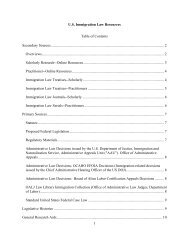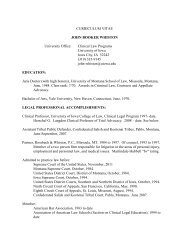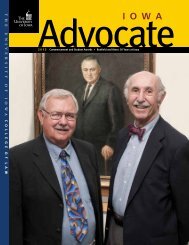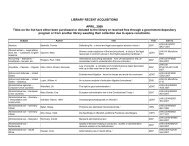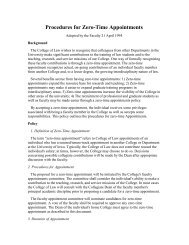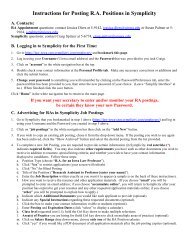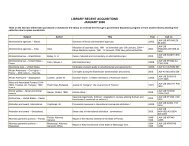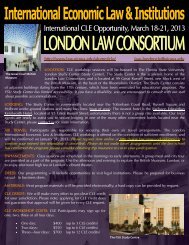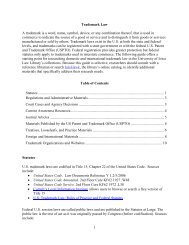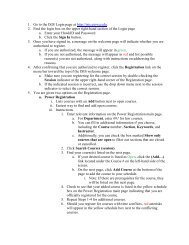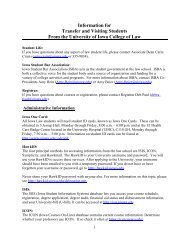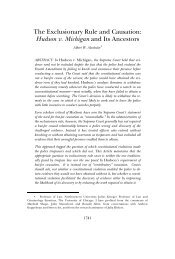Thel Final9/18/2008 1:11 PM962 The Journal of Corporation Law [Vol. 33:4IV. FREE WRITING PROSPECTUSES AND SECTION 12(a)(2)A. <strong>Free</strong> <strong>Writing</strong> Prospectuses are Not Exempt from Section 12(a)(2)The main differences between free writing and free writing prospectuses are that thelatter: (1) may be used before a registration statement becomes effective; and (2) aresubject to section 12(a)(2). Indeed, the SEC made them free writing prospectuses toachieve these results. 98 In adopting its new rules, the SEC repeatedly emphasized that freewriting prospectuses are subject to liability under section 12(a)(2). 99 It also acted toestablish that a wide range of communications are in fact free writing prospectusessubject to such liability. The Commission emphasized the breadth of the statutorydefinition of offer, 100 which is the predicate for the definition of prospectus, andexpanded the definition of prospectus directly by effectively defining most electronicoffers to be written communications and thus prospectuses. 101The Commission also adopted a new rule intended to ensure that issuers will beliable under section 12(a)(2) for false free writing prospectuses they prepare that aredistributed by their underwriters. The section 12(a)(2) liability of issuers of underwrittenpublic offerings is problematic because the section provides that any person who offers orsells a security by means of a prospectus or oral communication that includes an untruestatement of material fact “shall be liable to the person purchasing such security fromhim.” 102 This language leaves some doubt about who is a good defendant in a section12(a)(2) action. For example, in a firm commitment underwriting, the issuer sells to theunderwriters, who in turn sell to the public. If a prospectus prepared by the issuer anddelivered by the underwriter contains a false statement, a purchasing investor will havepurchased from the underwriter and not the issuer, and thus the issuer may not be liableto the investor under section 12(a)(2). 10398. As a prospectus permitted under section 10(b), a free writing prospectus is not free writing. SecuritiesAct of 1933 § 2(a)(10)(a), 15 U.S.C. § 77b(a)(10)(a) (2000). Conversely, free writing is explicitly excludedfrom the definition of free writing prospectus. Rule 405, 17 C.F.R. § 230.405 (2006).99. See, e.g., Securities Offering Reform, supra note 1, at 44,734 (“The rules we are adopting today ensurethat appropriate liability standards are maintained. For example, all free writing prospectuses have liabilityunder the same provisions [including section 12(a)(2)] as apply today to oral offers and statutory prospectuses. . . .”). The Commission‟s adopting release cited section 12(a)(2) more than seventy times. Id.100. Id. at 44,731 n.88.101. See Rule 405, 17 C.F.R. § 230.405 (2006) (defining graphic communication and writtencommunication); see also Securities Offering Reform, supra note 1, at 44,732, 44,753-55 (explaining therationale for expanding the definition of prospectus). The SEC‟s Division of Corporate Finance hassubsequently reemphasized that many corporate communications that are ultimately reduced to graphic form,whether printed or electronic, are free writing prospectuses if made while securities are being distributed.Securities Offering Reform Questions and Answers Nov. 30, 2005,http://www.sec.gov/divisions/corpfin/faqs/securities_offering_reform_qa.pdf (last visited Apr. 3, 2008).102. 15 U.S.C. § 77l (2000).103. See Lone Star Ladies Inv. Club v. Schlotsky‟s Inc., 238 F.3d 363, 370 (5th Cir. 2001) (“[I]n a firmcommitment underwriting, such as this one, the public cannot ordinarily hold the issuers liable under section 12,because the public does not purchase from the issuers.”); Shaw v. Digital Equip. Corp., 82 F.3d 1194, 1216 (1stCir. 1996) (holding that issuer and directors in a firm commitment underwriting generally cannot be held liableunder section 12[(a)](2)); 9 LOSS & SELIGMAN, supra note 13, § 11.C.2, at 4239-40 (“Subject to exceptionsinvolving controlling persons, agents and aiders and abettors, it seems quite clear that § 12 contemplates only an
Thel Final9/18/2008 1:11 PM2008] <strong>Free</strong> <strong>Writing</strong> 963New Rule 159A(a) 104 imposes section 12(a)(2) liability on issuers in somecircumstances when an offering participant uses a misleading issuer-prepared free writingprospectus, even if the security sold does not pass directly from the issuer to the plaintiffpurchaser. 105 Rule 159A(a) provides that if securities are offered or sold to a person bymeans of certain communications, including free writing prospectuses, prepared by or onbehalf of an issuer, then[f]or purposes of section 12(a)(2) of the Act only, in a primary offering ofsecurities of the issuer, regardless of the underwriting method used to sell theissuer‟s securities, seller shall include the issuer of the securities sold to aperson as part of the initial distribution of such securities, and the issuer shallbe considered to offer or sell the securities to such person . . . . 106B. <strong>Free</strong> <strong>Writing</strong> About <strong>Free</strong> <strong>Writing</strong> ProspectusesThe thesis of this Article is that section 12(a)(2) liability should not attach to manyfree writing prospectuses, and that, rather than undertaking to expand the scope of thesection, the SEC should have immunized those prospectuses from liability. Beforeexplaining why this is so, it is of course appropriate to establish that the SEC hasauthority to provide this immunity. As discussed below, the Commission has ampleauthority to do so. Remarkably, however, an examination of the authority upon which theCommission relied in adopting its reform agenda also shows that the Commission wasnot very careful in grounding its new rules in its Securities Act rulemaking authority.1. Issuer LiabilityThe intent behind new Rule 159A(a) is tolerably clear: issuers that prepare false freewriting prospectuses that are used in firm commitment underwriting are liable undersection 12(a)(2) even when the plaintiff purchases from an underwriter. What isremarkable is the way the Commission undertook to accomplish its goal. TheCommission has extensive rulemaking authority under the Securities Act, but it does nothave authority to create private causes of action. As the Rule‟s caption—“Definition ofseller for purposes of section 12(a)(2) of the Act,”—and language indicate, 107 in adoptingrule 159A(a) the Commission was relying upon its authority, under section 19(a) of theAct, to make rules “defining accounting, technical and trade terms” used in the SecuritiesAct. 108 Rule 159A(a) defines the word “seller” in section 12(a)(2) to include the issuer incertain cases, and presumably this makes the issuer liable in those cases. But the wordaction by a buyer against his or her immediate seller. That is to say, in the case of the typical „firm commitmentunderwriting,‟ the ultimate investor can recover only from the dealer who sold to him or her.”).104. Rule 159A(a), 17 C.F.R. § 230.159A(a) (2007).105. See Securities Offering Reform, supra note 1, at 44,769 (explaining liability of the issuer as “seller”).106. Rule 159A(a), 17 C.F.R. § 230.159A(a) (2007).107. Id.108. The Commission usually offers only vague explanations of its statutory authority to adopt rules, and itdid so in this case as well. See Securities Offering Reform, supra note 1, at 44,798 (stating generally that itadopted the new rules “pursuant to” a variety of Securities Act, Securities Exchange Act, and InvestmentCompany Act provisions).



